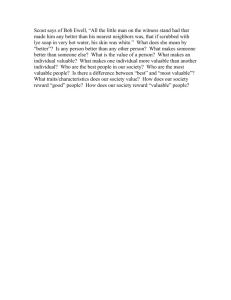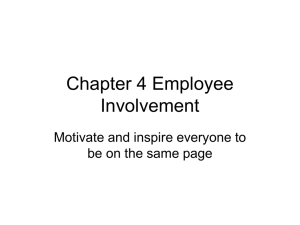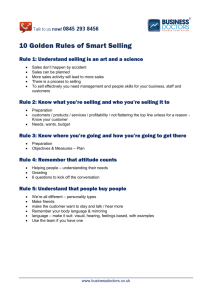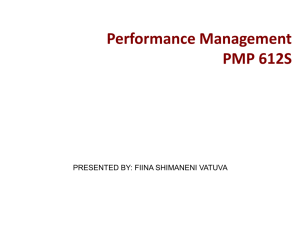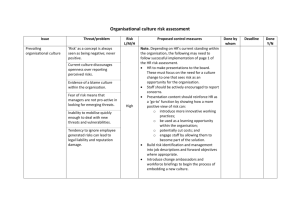About Reward Management
advertisement
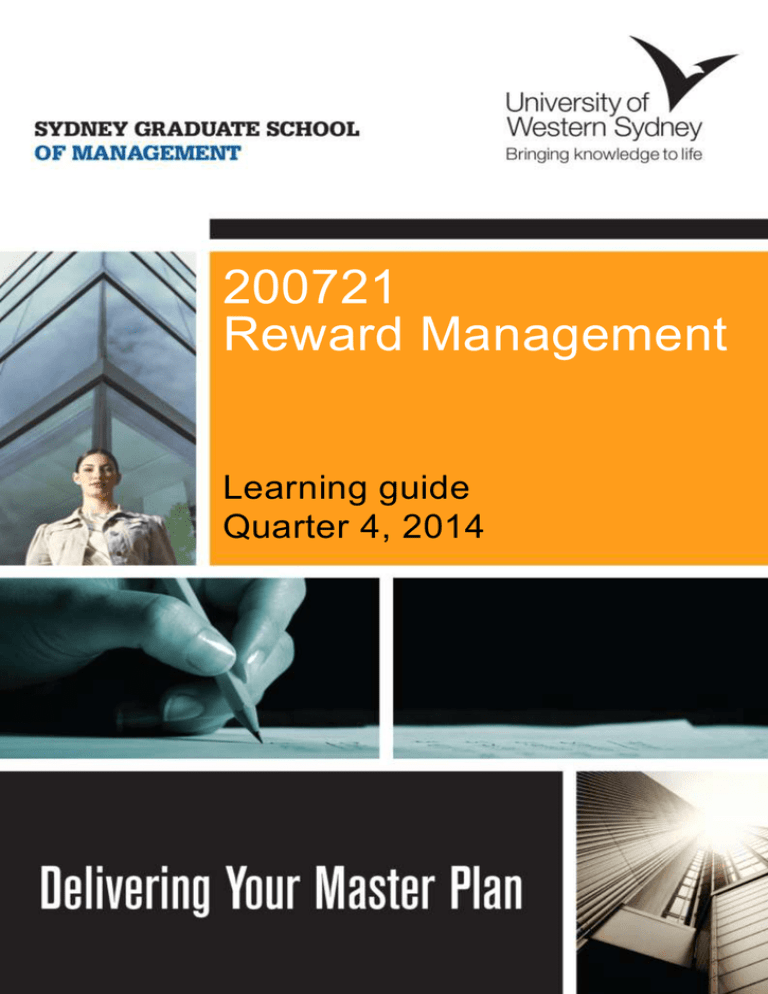
200721 Reward Management Learning guide Quarter 4, 2014 200721 REWARD MANAGEMENT (PG) QUARTER 4, 2014 | CONTENTS Contents SECTION THREE SECTION ONE ABOUT REWARD MANAGEMENT 1 TEACHING ACTIVITIES Contacts 1 Schedule of activities Unit overview 1 Student feedback 2 13 SECTION FOUR LEARNING RESOURCES SECTION TWO 13 14 Overview of learning resources and assessment 14 ASSESSMENT INFORMATION 3 Essential reading 14 Learning outcomes 3 Referencing requirements 15 Assessment summary 3 Librarian 15 Assessment 1: Case Study (30%) 4 Other resources that might help with university life 15 Overview 4 Details 4 SECTION FIVE Marking criteria and standards 5 YOU AND THIS UNIT 7 SGSM Client Services 17 Overview 7 Enrolment changes 17 Details 7 Teaching staff 17 Marking criteria and standards 8 What is expected of you 17 Assessment 2: Essay (50%) Assessment 3: Analysis of Reward Negotiation (20%) 17 9 Attendance and workload 17 Overview 9 Special requirements 18 Details 9 Marking criteria and standards 10 General submission requirements 12 Assignment cover sheet 12 Turnitin 12 Late submission 12 Extension of due date for submission 12 Key policies 19 200721 REWARD MANAGEMENT (PG) QUARTER 4, 2014 | SECTION ONE About Reward Management Contacts Below is a list of contacts for this unit. Please liaise directly with your lecturer/unit coordinator regarding appropriate consultation times. It is usually best to make contact with these staff via email. Unit Coordinator Dr Ben Imbun Building ED,G.51 Parramatta campus & Teaching Academic Phone: 9685 9562 Director, Postgraduate Education Dr Laurel Jackson 100 George Street, Parramatta City campus Phone: 9685 9197 Administration Email: la.jackson@uws.edu.au SGSM Client Services Ground floor, 100 George Street, Parramatta City campus Phone: (02) 9685 9801 Liaison librarian Email: b.imbun@uws.edu.au Email: sgsmclientservices@uws.edu.au Paul Jewell Business Librarian, Parramatta campus Phone: 9685 9358 Email: p.jewell@uws.edu.au Unit overview Welcome to Reward Management. This unit enables employment relations professionals to deploy advanced practitioner skills in specific workplace and institutional contexts. The management and the negotiation of reward are emphasised. Innovations such as str ategic and “total reward” strategies are critically examined. These innovations relate to the key issues of market-imperatives and fairness, including the balance between collective and individually determined reward and reward strategies related to perfor mance. This unit will enhance your existing skills and knowledge in employment relations through its focus on reward management; reward management is a core activity in human resource management and industrial relations. Typical practices include reward p ackaging, reward negotiation (collective and individual), reward planning, interpreting the impact of regulation on reward practice, devising grading systems, defining and determining reward progression, designing reward in globalised environments, and across country borders. Our objective is that you develop knowledge of contrasting approaches to these activities and be able to differentiate between different reward management strategies. This learning guide supplements the unit outline and is designed to assist you in the unit. It focuses each week on what you need to do to prepare effectively for seminars as well as the various assessment tasks throughout the unit. Each week consul t the relevant section of this learning guide as you plan your work. The learning guide highlights the focus for each week’s 1 200721 REWARD MANAGEMENT (PG) QUARTER 4, 2013 | SECTION ONE learning and teaching each week, as too essential reading. Our objective is to use the four hour seminar in a creative and productive way, through a balance between seminar stimulus material, seminar discussion, seminar presentation, and assessment preparation and consultation. Student feedback Student feedback pays a vital role in improving the quality and educational effectiveness of UWS units and in ensuring academic staff keep in touch with student needs. At the end of the quarter you will be given the opportunity to complete a Student Feedback on Unit (SFU) questionnaire to assess the unit. If requested by your unit coordinator, you may also have the opportunity to complete a Student Feedback on Teaching (SFT) questionnaire to provide feedback for individual teaching staff. For further information on student feedback and to view examples of the questionnaires, go to http://www.uws.edu.au/opq/planning_and_quality/surveys . Recent changes made to the unit on the basis of student feedback include the availability of stimulus material for the Assessment 3 and an increased capacity for students to discuss context and organisation scenarios in the essay. 2 200721 REWARD MANAGEMENT (PG) QUARTER 4, 2014 | SECTION TWO Assessment information Learning outcomes Learning outcomes for this unit are outlined in the below table. Upon completion of this unit, students will be able to: 1. Contrast, analyse and utilise the research literature to facilitate the analysis of reward management. 2. Apply multidisciplinary and competing stakeholder perspectives in debates and analysis of contemporary reward management . 3. Critically analyse reward management debates and evaluate alternative policy prescriptions. 4. Apply advanced reward practitioner skills in both workplace and institutional settings, in reward design and the negotiation of reward . 5. Analyse the negotiation of reward and the dynamics of disputes that arise within reward management. Assessment summary ASSESSMENT NUMBER ASSESSMENT ITEM AND DUE DATE 1. Case study (Individual)(1,500 words) Due: Session 5 (23 October 2014) 2. Essay (3,000 words) Due: Session 10 (27 November 2014) 3. Analysis of reward negotiation (group) (30minute presentation) LEARNING OUTCOMES VALUE (/100) 4 30% 1-3 50% 5 20% Due: As scheduled Final marks and grades are subject to confirmation by the School Assessment Committees which may scale, modify or otherwise amend the marks and grades for the unit, as may be required by University policies. To successfully complete this unit, students must: Achieve a minimum of 50 marks. Complete all assessment items (including making a satisfactory contribution to group work). 3 200721 REWARD MANAGEMENT (PG) QUARTER 4, 2014 | SECTION TWO Assessment 1: Case study (Individual) (30%) Overview This assessment is an individual case study. The response should be written in essay style. The case study addresses different stakeholder perspectives on the regulation and negotiation of reward, an issue that we address primarily in Session 2 but also throughout the unit. Australian regulation provides that the Fair Work Commission is required to review modern award minimum wages and to make a national minimum wage order. This work is conducted by the Minimum Wage Panel. The Panel is required to conduct an annual wage review in each financial year. Any determination made varying mini mum wages in modern awards in the review must come into operation on 1 July in the next financial year, unless there are exceptional circumstances. The Fair Work Act sets out some important process requirements for the review. They include provision of a reasonable opportunity to all persons and bodies to make written submissions, publication of the written submissions and a reasonable opportunity for submissions to be made in reply. Traditionally these submissions reflect stakeholder views as to the rel evance of minimum wage regulation. The Minimum Wage Panel has conducted its annual wage review for 2013-14. Submissions to the 2013-2014 review can be found at https://www.fwc.gov.au/awards-andagreements/minimum-wages-conditions/annual-wage-reviews/annual-wage-review-2013-14 The decision can be found at https://www.fwc.gov.au/awards-and-agreements/minimumwages-conditions/annual-wage-reviews/annual-wage-review-2013-14-1 Key submissions and the decision have also been uploaded to the vUWS site. Details In this case study you are required to select, read and analyse the following stakeholder submissions: Australian Council of Trade Unions (pp. 1-22, 88-112) Employer organisations: Australian Chamber of Commerce and Industry (pp. 4-6, 54-74) Australian Business Industrial (pp. 1- 4) Australian Industry Group (pp. 25-38, 41-49) Note: You are required also to read the decision of the Minimum Wage Panel (pp. 1-27, 146-148). Having analysed these documents please answer the following question. 4 200721 REWARD MANAGEMENT (PG) QUARTER 4, 2014 | SECTION TWO Question What do the submissions of the Australian Council of Trade Unions (ACTU) and employer organizations reveal about their approach to minimum wage determination? To what extent were these views reflected in the 201 3-2014 Minimum Wage Review decision of Fair Work Commission. In your view, how do the respective stakeholder approaches to minimum wage determination align with contemporary reward management? The key focus in this assessment is for students to discursively appraise the approach of particular stakeholders, as well as Fair Work Commission to reward management. It is anticipated that students will use the scholarly literature also to assist their understanding of, and approach to contemporary reward management. Students will find references on contemporary reward management identified in the resources listed in this learning guide, in addition to those identified for Session 4. We will discuss the submissions of the Australian Chamber of Commerce and Industry, Australian Industry Group, Australian Business Industrial and the Australian Council of Trade Unions and the decision of Fair Work Commission in Session 2 and 3. Students should utilise a minimum of four references. These references are in addition to the Fair Work Commission decision and the submissions by the Australian Chamber of Commerce and Industry, Australian Industry Group, Australian Business Industrial and the Australian Council of Trade Unions. Students are not confined to the references listed in this Learning Guide and are encouraged to identify their own material. Marking criteria and standards CRITERIA FAIL PASS CREDIT DISTINCTION Unsatisfactory performance Just satisfactory performance Good quality showing more than satisfactory performance Superior quality demonstrating independent thinking HIGH DISTINCTION Quality of research. Research based only on a few or irrelevant secondary sources. Research based on few but relevant secondary sources mostly emphasising a single perspective. Meets minimum criteria of four references. Research based on adequate number of relevant secondary sources representing all perspectives in general terms. Research based on important secondary sources representing all perspectives. Research is well beyond minimum requirements. Research based on important secondary sources representing all perspectives. Research is significantly beyond minimum requirements. Knowledge of /application of important themes and concepts concerning stakeholder perspectives on minimum wage regulation and contemporary reward management. Lack of understanding of themes and concepts or just mentioning the terms without showing understanding. Use of terms shows some comprehension important themes and concepts but only a generalist understanding. Using implicitly the language of important themes and concepts, with a good understanding. Discussing important themes and concepts and using this discussion for the analysis of the issues. Excellent integration of literature through a discussion of important themes and concepts including insights to contrasting approaches. Outstanding quality showing creativity and originality 5 200721 REWARD MANAGEMENT (PG) QUARTER 4, 2014 | SECTION TWO CRITERIA FAIL PASS CREDIT DISTINCTION Unsatisfactory performance Just satisfactory performance Good quality showing more than satisfactory performance Superior quality demonstrating independent thinking Level/relevance of analysis concerning the integration of stakeholder perspectives by Fair Work Commission and the responsiveness of the decision to the requirements of contemporary reward management. Analysis mostly absent; emphasis is on descriptive writing. Evident is analysis is poorly related to the question. Identifying different perspectives; describing them adequately but not relating them. Analysis is only generally related to the question but with key omissions. Identifying different perspectives; discussing them and identifying the differences between them. Analysis of the integration of stakeholder perspectives and outcomes for contemporary reward management (CRM) is well related to the question. Discussing different perspectives critically integrating the relations between them and extracting implications from differences and similarities. Analysis of the integration of stakeholder perspectives and outcomes for CRM is acutely directed to the question. Discussing different perspectives, critically integrating the relations between them and extracting implications from differences and similarities, inferring nuances and contradictions. Analysis of the integration of stakeholder perspectives and outcomes for CRM is acutely directed to the question, leading to a consistent level of in-depth understanding. Quality of discussion/ argument. No discussion or argument. Poor use of argument, unconvincing explanations to substantiate points discussed. Minimal but convincing use of argument to substantiate the points under discussion. Relevant and convincing use of arguments to substantiate the points under discussion. Relevant convincing use of arguments to substantiate points, integrating different perspectives. Communication of ideas through the organisation, structure and logic of argument. Incomprehensible, poorly structured; fragmented ideas; disconnected paragraphs that do not follow a clear argument. Relatively coherent argument, manages to communicate the ideas but difficult to understand links between paragraphs. There is a clear structure with coherence in the presentation of ideas producing a satisfactory and comprehensive argument. There is a clear structure with coherent presentation of ideas and comprehensive, well sustained argument. A sustained, coherent and logical argument. Able to synthesise and integrate complex ideas. Clarity of expression (sound sentence structure, grammar and spelling). Incomprehensible due to poor written language competence or careless writing. Satisfactory but with difficulti es in communicating ideas due to careless writing and lack of proof-reading. Some language mistakes but good communication of ideas, basically well written. Very well written with few minor mistakes due to distractions. Excellent writing which demonstrates careful revision to avoid minor mistakes. Referencing. Inadequate, inappropriate or inaccurate referencing that does not conform to the conventions of Harvard Referencing may result in the essay receiving a fail grade overall and the possibility of academic misconduct. Marks may be deducted for poor referencing technique but marks will not be awarded for appropriate referencing technique. Mark range (/30) 0-14.5 15-19.0 19.5-22.0 22.5-25.0 HIGH DISTINCTION Outstanding quality showing creativity and originality 25.5-30 6 200721 REWARD MANAGEMENT (PG) QUARTER 4, 2014 | SECTION TWO Assessment 2: Essay (50%) Overview This essay takes up issues raised in Session 4 and explored further in Sessions 5 and Sessions 6. It asks students to critically assess challenges inherent in reward management. These challenges which include the financial crisis, the international outsourcing of jobs andthe emergence of a service economy, have forced organisations to look at their asset bases, including reward management much more carefully. The literature is filled with debates of how organisations should effectively manage reward management in order to achieve optimal organisation performance. Some authors see the reward strategy management in very direct terms; other authors see the management as more complex. Human Resource Management including reward management may facilitate strategic options and outcomes for the organization. However, effective reward management require a knowledge of current theory and specific practices. These challenges are complex ones and encompass how practitioners, organisations and scholars manage the effectiveness of particular practices and approaches. Our interest lies with reward management. The reward management literature is becoming increasingly reflective. There is an emerging critique concerning contemporary reward management. The assessment requires that you read the literature carefully but that you critically appraise the different viewpoints you encounter. We will establish a work program for Sessions 7 for students to consult with the Unit Coordinator about the progress in their readings and their develop ment work in preparing for the essay. This will be through the supply of a one week outline as per a template that will be made available on vUWS. Details Through discussion and analysis students are required to identify the key elements of a reward management strategy in a given organisation. Students are able to identify the scale of organisation, the industry and national context. The discussion should id entify the ways in which the selected strategy addresses the complexity of reward management as it pertains to the organisation (employer), individual (worker) and society. It is anticipated that the discussion will assess the issues that are prevalent in the literature discussed in Weeks 5 and 6. For example, your discussion may reflect on, and address the weaknesses in reward strategy identified by Cox, Brown and Reilly (2010). Equally you may address the implications for reward management raised by Arms trong, Brown and Reilly (2011) in their discussion of the need for evidence -based approaches. Students should utilise a minimum of 10 references. The readings identified for Session 5 are a good starting point. Students are not confined to the references listed in this learning guide and are encouraged to identify their own material 7 200721 REWARD MANAGEMENT (PG) QUARTER 4, 2014 | SECTION TWO Marking criteria and standards CRITERIA FAIL PASS CREDIT DISTINCTION Unsatisfactory performance Just satisfactory performance Good quality showing more than satisfactory performance Superior quality demonstrating independent thinking HIGH DISTINCTION Quality of research. Research based only on a few or irrelevant secondary sources. Research based on few but relevant secondary sources mostly emphasising a single perspective. Meets minimum criteria of ten references. Research based on adequate number of relevant secondary sources representing all perspectives in general terms. Research based on important secondary sources representing all perspectives. Research is well beyond minimum requirements. Research based on important secondary sources representing all perspectives. Research is significantly beyond minimum requirements. Knowledge of /application of important themes and concepts conceding the expectations of reward management, and the construction of reward strategy. Lack of understanding of important themes and concepts or just mentioning the terms without showing understanding. Use of terms shows some comprehension of important themes and concepts but only a generalist understanding. Using implicitly the language of important themes and concepts, with a good understanding. Discussing important themes and concepts and using this discussion for the analysis of the issues. Excellent integration of literature through a discussion of important themes and concepts that is key to the analysis. Level/relevance of analysis concerning the strategies and measures that will facilitate effective reward management. Analysis mostly absent; emphasis is on descriptive writing. Evident is analysis is poorly related to the question. Identifying different perspectives; describing them adequately but not relating them. Analysis is only generally related to the question and with key omissions. Identifying different perspectives; discussing them and identifying the differences between them. Analysis of strategies and measures that will facilitate effective reward management is well related to the question. Discussing different perspectives critically integrating the relations between them and extracting implications from differences and similarities. Analysis of strategies and measures that will facilitate effective reward management is acutely directed to the question. Discussing different perspectives, critically integrating the relations between them and extracting implications from differences and similarities, inferring, nuances and contradictions. Analysis of strategies and measures that will facilitate effective reward management is acutely directed to the question, leading to a consistent level of in-depth understanding. Quality of discussion/ argument. No discussion or argument. Poor use of argument, unconvincing explanations to substantiate points discussed. Minimal but convincing use of argument to substantiate the points under discussion. Relevant and convincing use of arguments to substantiate the points under discussion. Relevant convincing use of arguments to substantiate points, integrating different perspectives. Outstanding quality showing creativity and originality 8 200721 REWARD MANAGEMENT (PG) QUARTER 4, 2014 | SECTION TWO CRITERIA FAIL PASS CREDIT DISTINCTION Unsatisfactory performance Just satisfactory performance Good quality showing more than satisfactory performance Superior quality demonstrating independent thinking HIGH DISTINCTION Communication of ideas through the organisation, structure and logic of argument. Incomprehensible, poorly structured; fragmented ideas; disconnected paragraphs that do not follow a clear argument. Relatively coherent argument, manages to communicate the ideas but difficult to understand links between paragraphs. There is a clear structure with coherence in the presentation of ideas producing a satisfactory and comprehensive argument. There is a clear structure with coherent presentation of ideas and comprehensive, well sustained argument. A sustained, coherent and logical argument. Able to synthesise and integrate complex ideas. Clarity of expression (sound sentence structure, grammar and spelling). Incomprehensible due to poor written language competence or careless writing. Satisfactory but with difficulties in communicating ideas due to careless writing and lack of proof-reading. Some language mistakes but good communication of ideas, basically well written. Very well written with few minor mistakes due to distractions. Excellent writing which demonstrates careful revision to avoid minor mistakes. Outstanding quality showing creativity and originality Assessment 3: Analysis of reward negotiation (20%)(Group) Overview Note: This assessment is a group presentation. There will be group presentations scheduled from Session 6 onwards (with the exception of Week 8). These will be finalised with the unit coordinator by Session 4 but groups may nominate their topic to the unit coordinator in Sessions 2 and 3. The unit coordinator will negotiate the timing of presentations with groups. It is anticipated that groups will comprise four students but this may be revised depending on the number of students in the class. It is anticipated further that there will be a two case studies per week. Details Students are required to present an analysis of a reward negotiation, the introduction of a new or revised reward management practice or a contemporary reward practic e requiring negotiation and implementation. This presentation should be 30 minutes in duration (excluding questions). Groups should not incorporate class discussion directly into their presentation but present material that will provoke class discussion at their conclusion. A member of the class will be appointed to the role of discussant for each presentation – discussants can direct questions to the presenting group, and facilitate the exchange of questions/discussion themes from the class. For each week of presentation (6, 7, 9, 10) two relevant case studies have been chosen for students to consider. These case studies are fictional and are taken from the Harvard Business Review. The follow the format of presenting a problematic through a fictional case study and then asking experts to comment on the problematic as examined thought the case study. The problematic is linked to the issue examined in each week’s seminar. 9 200721 REWARD MANAGEMENT (PG) QUARTER 4, 2014 | SECTION TWO Note: Students may choose an alternative case study if they wish. In these instances the case study should be linked to the issue examined in each week’s seminar – indeed this is encouraged. If the matter is a reward negotiation it can be an individual or collec tive negotiation. The reward negotiation or reward management practice may have been reported in the academic or popular literature. This popular literature may include the popular media. The negotiation can be drawn from any country. In presenting their analysis of the reward negotiation or reward management practice it will be anticipated that the presentation will address: A summary of the key features of the case study and the problematic concerning reward management it presents. This summary should take no longer than five minutes of the presentation). A synopsis of the advice provided by the expert opinions cited by the case studies (this is not required where students have sourced their own case study), The most important issues in the case study c oncerning reward management. These should be related to the theme of each week’s seminar. The extent to which the case study reflects or challenges prevailing research related to the theme of each week’s seminar. Students are encouraged to go beyond the literature identified for each week’s seminar. A critique of the outcomes presented by the case study and/or expert opinion. CHOICE OF CASE STUDIES Week 6: Managing reward strategy Only two of these case studies can be selected: 1992, ‘The case of the unpopular pay plan’, Harvard Business Review , vol. 70, no. 1, pp. 14-23. 1996, ‘Growing pains’, Harvard Business Review , vol. 74, no. 4, pp. 20-36. 2003, ‘The best laid incentive plans’, Harvard Business Review , vol. 81 no. 1, pp. 27-37. Week 7: Ethics and reward management 2001, ‘When salaries aren’t secret’, Harvard Business Review , vol. 79, no. 5, pp. 37-49. Week 9: Globalisation and reward management 2010, ‘Setting up shop in a political hot spot’, Harvard Business Review , vol. 88, no. 10, pp. 141-145. Week 10: Executive remuneration 2003, ‘In a world of pay’, Harvard Business Review , vol. 81, no. 11, pp. 31-40. Spare case study 2011, ‘The gentlemen’s three’, Harvard Business Review , vol. 89, no. 7, pp. 157-161. 2012, ‘Bonuses in bad times’, Harvard Business Review , vol. 90, no. 7, pp. 153157. 2012, ‘Play it safe at home, or take a risk abroad’, Harvard Business Review , vol. 90, no. 1, pp. 145-149. A second case study, if required, will be made available through vUWS. Note: Links to the above case studies can be found in the ‘Readings and Resources’ link with in the unit vUWS site . 10 200721 REWARD MANAGEMENT (PG) QUARTER 4, 2014 | SECTION TWO Marking criteria and standards CRITERIA Organisation of presentation Identification and understanding of key themes linking case study to these themes Understanding of the extent to which the case study reflects or challenges existing research Critique of the outcomes of the case study/ expert opinion Fail = Unsatisfactory performance Identifies and understands very few of the thematic issues. Case study is poorly linked to these themes. Incomplete research and links to the material relied. 0-9.5 Order is confusing; ideas and details not shaped. Hard to follow the flow of ideas. Poor use of presentation aids. Poor time management. Presentation fails to critique the outcomes of the case study/expert opinion Pass = Just satisfactory performance Order of presentation mostly makes sense. 10-12.5 Acceptable use of presentation aids. Kept approximately to time limits. Identifies and understands some of the key themes. Case study is linked to these themes but with omissions. Limited research and satisfactory understanding of the material relied upon. Presentation offers limited critique of the outcomes of the case study/expert opinion. Credit = Good quality showing more than satisfactory performance Order of presentation makes sense. Obvious cohesion Most details correct. Presentation aids are clear and well utilised. Kept to time limits. Identifies and understands most of the key themes. Complexities in the case study are acknowledged and there are limited omissions. Good research and credible understanding of the material relied upon. Presentation offers a robust critique of the outcomes of the case study/expert opinion Clear direction and moves seminar participants through presentation. Creative use of presentation aids. Very good time management throughout. Identifies and understands all of the key themes. Complexities in the case study are acknowledged and addressed. There are very few omissions Excellent research into the issues with clear, insightful understanding of the material relied upon. Presentation offers a compelling critique of the outcomes of the case study/expert opinion. Exemplary consistency, flow and effectiveness of presentation. Excellent understanding of all relevant themes. Complexities in the case study and their linkage to key themes are integral to the presentation. Research of outstanding quality, comprehensive and insightful understanding of the material relied upon. Presentation offers a compelling and comprehensive critique of the outcomes of the case study/expert opinion. 13.0-14.5 Distinction = Superior quality demonstrating independent thinking 15.0-16.5 High Distinction = Outstanding quality showing creativity and originality 17.0-20.0 Arguments build logically. Conclusion provokes thought. Presentation aids augment and extend the presentation in unique and creative ways. Excellent time management throughout. 11 200721 REWARD MANAGEMENT (PG) QUARTER 4, 2014 | SECTION TWO General submission requirements Assignment cover sheet All assessments must be handed to the lecturer at the commencement of the class on the due date. All assignments are to be submitted with an Assignment Cover Sheet. Note: Assignment cover sheets and the evaluation form can be located on vUWS. Note: Students are to keep a copy of all assignments submitted for marking. Turnitin The Turnitin plagiarism prevention system is being used with this unit. All assessments must be submitted via the Turnitin system (unless alternative arrangements are advised by your lecturer) on or before the due date and time. Turnitin is a software product that reports on similarities between your paper and other documents. There is a great deal of information regarding Turnitin including an instructional guide at: http://library.uws.edu.au/turnitin.php. Turnitin is used by over 30 universities in Australia and is increa singly seen as an industry standard. It is an important tool to assist with students with their academic writing by promoting awareness of plagiarism. Late submission A student who submits a late assessment will be penalised by 10 per cent per day up to 10 days i.e. marks equal to 10 per cent of the assignment’s worth will be deducted as a “flat rate” from the mark awarded. For example, for an assignment with a possible highest mark of 50, the student’s awarded mark will have five marks deducted per late day. Saturday and Sunday count as one day each. Assessments will not be accepted after the marked assessment task has been returned to students who submitted the task on time except where compulsory items of assessment must be submitted. An assessment submitted at any time after the due time on the due date will be deemed to be a late submission and late submission penalties will accrue immediately from the due time and date. Extension of due date for submission Normally no extension will be approved. Contact your lecturer before the due date of the assignment for any extension in extraordinary circumstances only. Where special consideration is sought for circumstances involving more than three consecutive days or more than five days within a teaching period, students should complete a Special Consideration Application, available as an e-form via the UWS website. 12 200721 REWARD MANAGEMENT (PG) QUARTER 4, 2014 | SECTION THREE Teaching activities Schedule of activities Quarter 4 teaching begins on Monday, 22 September 2014. There is one public holiday this quarter which may affect classes. Labour Day falls on Monday, 6 October 2014. Alternative teaching arrangements for any classes affected by this public holiday will be posted on vUWS. SESSION PROGRAM SCHEDULE WEEKLY ACTIVITIES 1 Unit overview. Corby (2009). 25 September Debates in reward management 2. Reward management and regulation in a changing world. Watts (2010). Employee voice in reward management . Heery (2009). Reconceptualising reward management . Lawler (2005). 5. Evaluating reward management. Cox, Brown and Reilly (2010). 23 October Due: Assessment 1 – Case study due 6.00pm. 6. Managing reward strategy. 2 October 3. 9 October 4. 16 October 30 October 7. Ethics and reward management. Lowry (2006). Essay workshop. Supply of one page outline through template made available on vUWS Globalisation and reward management. Friedman (2007). 10. Executive reward. Bebchuk and Fried (2006). 27 November Due: Assessment 2 – Essay due 6.00pm. 6 November 8. 13 November 9. 20 November 13 200721 REWARD MANAGEMENT (PG) QUARTER 4, 2014 | SECTION FOUR Learning resources Overview of learning resources and assessment The table below outlines how the learning resources can be best used to address the assessment tasks for this unit. RESOURCE ASSESSMENT 1: CASE STUDY ASSESSMENTS 2: ESSAY ASSESSMENT 3: ANALYSIS OF REWARD NEGOTIATION Teaching staff There are key, identified seminars to which will focus on resources that are key to the understanding of the requirements of the case study. The seminars will include opportunities to prepare formative material, and to discuss the challenging questions raised by the essay. There will be opportunities in the seminars at the commencement of the quarter for groups to initiate their work on this assessment. Library View Library’s homepage; The Library Search Box is a great library resource that will help you find information relevant to the essay, if needed: http://library.uws.edu.au/ Use the identified journals to locate material that will form the basis of your analysis. http://library.uws.edu.a u . seek help from librarians; and/or SGSMliaison librarian. Textbook Read the prescribed submissions and FWA decision; raise key questions in the seminars. The learning guide will identify a subset of resources that will form the initial research for your essay. It is anticipated that groups will use a range of resources prepare for this assessment; this may include a range of practitioner journals/newsletters and newspapers. vUWS Look to the linkages between contemporary reward management and the issues raised by the FWA Decision. Visit vUWS. If you are uncertain about this assessment use the discussion board provided through vUWS. Watch for additional announcements & information regarding this essay. Essential reading Textbook There is no prescribed textbook for this unit. A compiled set of readings will be provided. 14 200721 REWARD MANAGEMENT (PG) QUARTER 4, 2014 | SECTION FOUR Recommended reading Essential readings for each session are identified within this leaning guide, as are further readings. The following resources all concern reward management and have been placed on Open Reserve at the Parramatta campus. Armstrong, M 2010, Armstrong's handbook of reward managemen t practice: improving performance through reward , Kogan Page Limited, London. Armstrong, M, Brown, D & Reilly, P 2010, Evidence-based reward management: creating measurable business impact from your pay and reward practices , Kogan Page Limited, London. Armstrong, M & Brown, D 2009, Strategic reward: implementing more effective reward management , Kogan Page, London. Corby, S, Palmer, S & Lindop, E (eds.) 2009, Rethinking reward , Palgrave Macmillan, Basingstoke. Shields, J 2007, Managing employee performance and reward : concepts, practices, strategies , Cambridge University Press, Cambridge. Storey, J 2007, Human resource management: a critical text . 3rd edn, Thomson Learning, London. White, G & Druker, J (eds.) 2009, Reward management: a critical text, 2nd edn, Routledge, London. Online resources Refer to the E-Resources page for Management at http://subjectguides.library.uws.edu.au/management Referencing requirements This unit uses Harvard UWS referencing style. Full details and examples are available on the library website at http://library.uws.edu.au/citing.php A full range of resources for searching and citing re ferences is available at: http://library.uws.edu.au/training.phtml Librarian For assistance in using library resources, refer to the inside front cover for contact details to arrange an appointment with your liaison librarian. Other resources that might help with university life University life Find out about life outside the lecture theatre – news and events, services and facilities, career information and more! http://www.uws.edu.au/currentstudents/current_students/services_and_facilities E-Learning Check your vUWS sites regularly for unit announcements and to keep up w ith online discussions. If you do not have access to vUWS please contact e-learning on https://vuws.uws.edu.au/ Disability Service Students with a disability should visit: http://www.uws.edu.au/currentstudents/current_students/getting_help/disability_ services 15 200721 REWARD MANAGEMENT (PG) QUARTER 4, 2014 | SECTION FOUR Course and unit rules This site provides information on pre -requisites, co-requisites and other matters concerning how your course is structured. http://www.uws.edu.au/currentstudents/current_students/managing_your_study/ enrolment/course_and_unit_rules The Learning and Teaching Unit The Learning and Teaching Unit provides valuable online resources for academic writing. Visit the Learning and Teachi ng Unit: Policies This site includes the full details of policies that apply to you as a UWS student. http://www.uws.edu.au/learning_teaching/learning_and_teaching http://www.uws.edu.au/policies/a -z 16 200721 REWARD MANAGEMENT (PG) QUARTER 4, 2014 | SECTION FIVE You and this unit SGSM Client Services SGSM Client Services will be your primary contact for all student administrative matters. If you have concerns regarding enrolment, results, fees then contact the SGSM Client Services team. Contact details are listed in Section 1 of this le arning guide. SGSM Client Services also organise a range of academic skills sessions for students which are free of charge. For details of the sessions, please contact SGSM on sgsmclientservices@uws.edu.au or 9685 9801. Enrolment changes If you do not formally withdraw from a unit on or before the census date you will incur a debt for the unpaid tuition fee. That debt cannot be transferred or deferred to another quarter. The timeframe to notify of changes for all units for this quarter is no later than 12 October 2014. You need to enrol and withdraw from units online via the My Student Records (MySR) site. Verbal notification will not be accepted. Please notify your unit coordinator if adding/remov ing a unit. All withdrawals from units must be done online before the Census date. Note: If you fail to notify Client Services you will be liable for all tuition fees and will receive a fail-discontinued grade – the onus is on you to correct your enrolment. Teaching staff Your unit coordinator will be your primary contact for all matters relating to this unit. If you have any concerns about the unit, please contact your unit coordinator in the first i nstance. If you would prefer to speak to someone else you are advised to speak to your Director, Academic Program. Contact details for the unit coordinator and the Director, Academic Program can be found in Section 1 of the learning guide. What is expected of you Attendance and workload SGSM has a recommendation that students should attend a minimum of 80 per cent of all classes in order to pass the unit. Please note that this means 80 per cent of class time, and not simply signing for 80 per cent of the classes. It is very important to note that at their discretion, your instructor may deem you have not attended a session if you just sign the class roll and then leave the class. Please let your lecturer know if you are unable to attend any session. 17 200721 REWARD MANAGEMENT (PG) QUARTER 4, 2014 | SECTION FIVE Students have a responsibility to: 1. Familiarise themselves with the University policies on assessment and examinations. 2. Ensure they read and understand the assessment requirements and note the submission dates, and seek assistance from the lecturer and/or unit coordinator when needed. 3. Notify relevant staff (e.g. lecturer, unit coordinator, disability adviser) as soon as possible prior to, or at the beginning of, the teaching session if they wish to have special requirements accommodated. 4. Submit for assessment their own individual and unassisted work, except as otherwise permitted, and understand that cheating, plagiarism, fabrication or falsification of data will be severely dealt with. 5. Behave ethically and appropriately, avoiding any action or behav iour which would unfairly disadvantage or advantage another student. 6. Ensure that they understand the requirements, including timetables, for examinations and other assessments tasks. In order to optimise the value of your learning, it is strongly advised to prepare before each session, enthusiastically participate in each session, and then reflect on each session. The amount of time spent out of class will vary for each individual, depending on competencies and proficiency in any area. An approximation is on 130 hours per unit, which is an average of 13 hours per session. Effective learning requires interaction between you, your instructor, and your peers. The better prepared you are before each session the greater the learning value from more focused questions and discussions. In addition, reflecting on what you have learned is an important process for you to confidently apply your newly learned skills. Therefore, in order to gain the most learning value from the synergistic relationship between your support materials and your specific unit material it is highly recommended you follow these steps for each session: Before each session Read the support materials, notes and answer any given questions or problems. Pre-read your instructor’s lecture notes f or more detailed comprehension. Follow any other learning leads from your Instructor including the vUWS site. During each session Enthusiastically participate in the “activities” guided by your instructor. Contribute to each session with focused questions and discussions. Attempt any questions and problems shown in your session. Identify clearly what you know and what you don’t know. Ask your instructor about any questions or problems from this or any session. After each session Attempt any questions and problems advised by your instructor. Reflect in action (while doing these questions and problems). Review the worked solutions to questions and problems. Reflect on action (after you have done these questions and problems). Identify clearly what you know and what you don’t know. Special requirements There are no essential or special requirements for this unit. 18 200721 REWARD MANAGEMENT (PG) QUARTER 4, 2014 | SECTION FIVE Key policies The University has a number of policies that relate to teaching and learning. Important policies that affect students include: Assessment Policy Code of Conduct Disability Policy Email Policy Examinations Policy Library Loans Policy Misconduct – Student Academic Misconduct Policy Misconduct – Student Non-Academic Misconduct Policy Occupational Health and Safety Guidelines and Procedures Occupational Health and Safety Policy Respect and Inclusion in Learning and Working Policy Review of Grade Policy Special Consideration Policy These policies can be located online at http://policies.uws.edu.au/. There are two policies that relate to misconduct – academic and non-academic misconduct. Breaches of these policies can have very serious consequences. It is essential that you are fami liar with these policies and how to avoid misconduct of any type . 19
